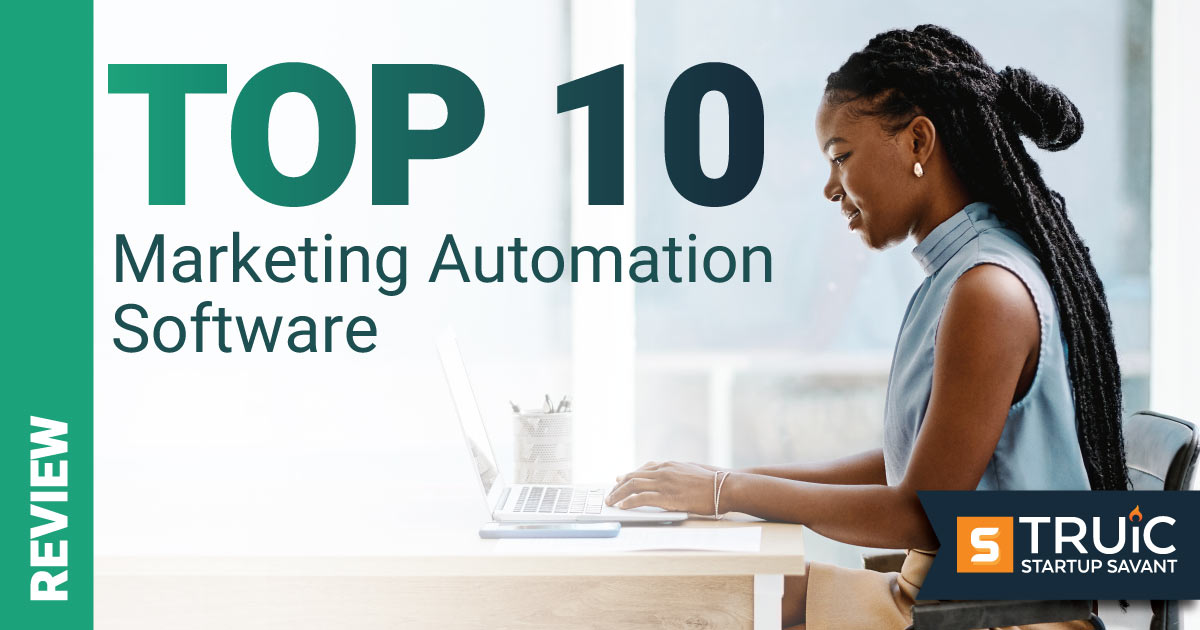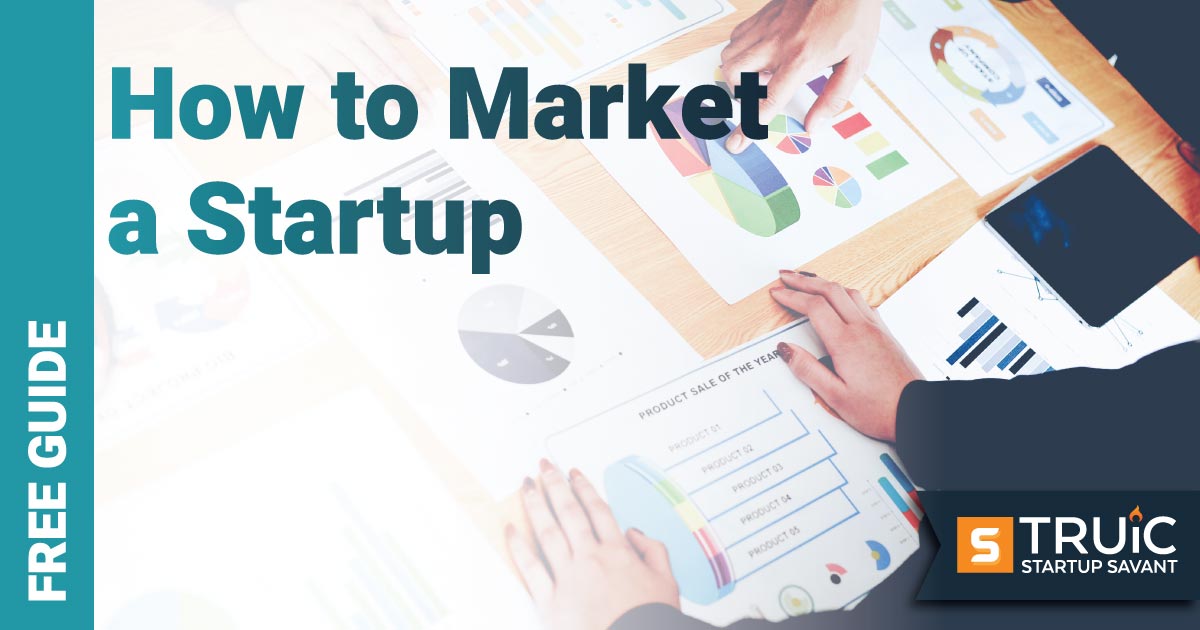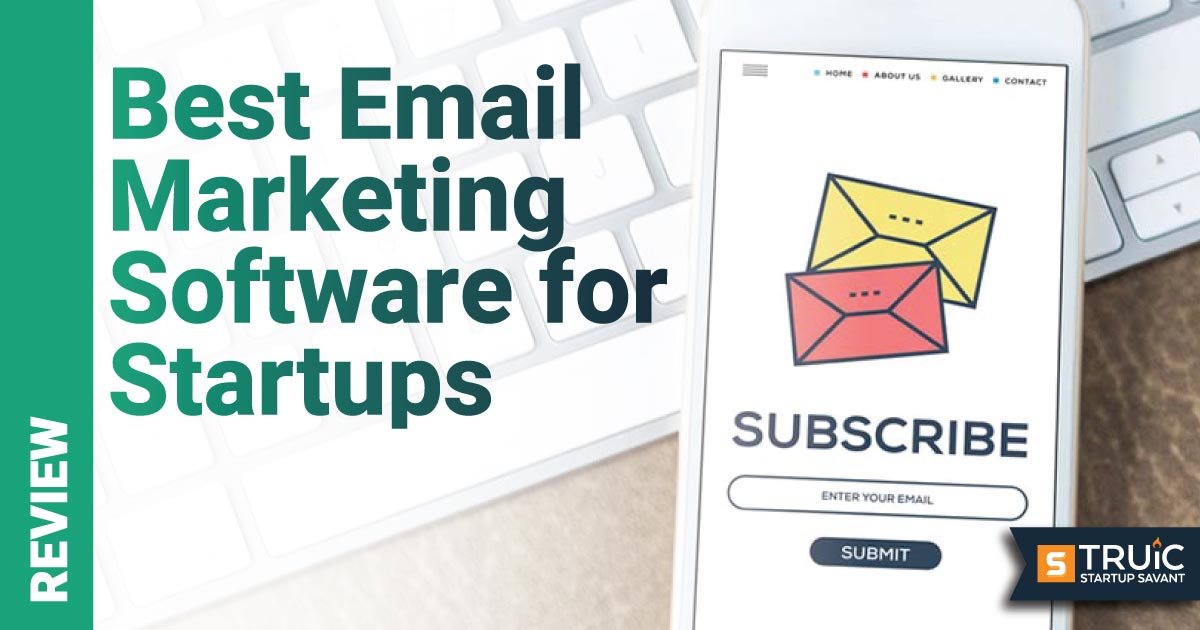10 Best Marketing Automation Software for Startups in 2024

Last Updated: By Madison Holt
Whether you’re an entrepreneur looking to make your mark in the business world or a founder eager to capture a larger share of the market – you're well aware that effective marketing is an essential part of scaling your business.
Even though it’s essential, however, you also know that it can be time-consuming and complex to implement and execute successfully.
Here’s the good news: marketing automation software can help you streamline your marketing efforts and drive your startup’s growth further than you thought possible.
In this review, we dive into some of the best marketing automation software designed for startups and look at each of their features, pros, and cons in detail. Let’s jump in!
Best Marketing Automation Tool: HubSpot
Top Marketing Automation Platforms
Think of marketing automation as your personal marketing assistant, tirelessly working around the clock and allowing you to target your audience more effectively through multiple channels such as email, social media, and websites. It essentially equips you with the tools you need to manage your marketing tasks more efficiently as well as monitor and analyze your performance along the way.
For startups where resources might be limited and every cent counts, marketing automation becomes more than a tool—it's a game-changer. It allows startup founders to make the most of their time by automating repetitive tasks, leaving them ample time to focus on strategic elements of their business.
With a good marketing automation platform, startups can also collect valuable insights about their target audience. This gives them a clear view of customer behavior and preferences and thereby helps tailor their marketing strategies in ways that resonate better with their target audience.
In short, implementing marketing automation software is a smart move for any startup. It provides a means to optimize marketing efforts efficiently and effectively while also freeing up much-needed time to focus on what truly matters – growing your business.
Whether your budget is limited or flexible, we have the perfect marketing automation software recommendation for you. Our list includes entry-level tools with basic features all the way up to robust, enterprise-level solutions. Keep scrolling to see which one is the best fit for your needs.
10 Best Marketing Automation Platforms:
Best Marketing Automation Tool: HubSpot
Need marketing automation that scales with your startup? HubSpot Marketing Hub grows alongside your business with flexible pricing plans. Get started for free today!
1. HubSpot
HubSpot is a key player in the realm of marketing automation with more than 30,000 customers. What sets it apart is its intuitive and aesthetically pleasing interface that turns complex marketing maneuvers into simple tasks easily navigated even by those who aren't tech-savvy. Its comprehensive set of tools for marketing and sales gives it an edge over competitors and makes the platform an integrated solution for any businesses looking to enhance their marketing strategies.
But quality comes at a price. Costs can escalate quickly as you add more features and contacts, which might give budget-conscious businesses some pause.
Pros
- Integrated marketing and sales platform
- User-friendly interface
- Comprehensive set of features
- Popular with small businesses
Cons
- Potentially expensive pricing structure
- Limited A/B testing in lower tiers
HubSpot Marketing Hub combines email, analytics, CRM, and more to help startups do more with less. Sign up now to streamline your stack.
2. GetResponse
GetResponse is a comprehensive marketing automation tool specifically designed with entrepreneurs and startups in mind. With multiple flexible pricing plans to choose from, starting with a cost-free plan, GetResponse ensures there's an option that perfectly aligns with your specific business needs. The free plan itself permits indefinite usage with up to 500 contacts and includes basic email marketing features.
The software stands out in the cluttered marketing tech space thanks to its powerful combination of autoresponders, templates, a website builder, a landing page builder, and webinar functionality. The recent addition of AI tools to generate newsletters and chat functionality to enable live chat on websites makes it a compelling choice for businesses aiming to maximize their marketing efforts.
By offering robust reporting features like one-click retargeting and ROI tracking, GetResponse empowers businesses to measure the performance of their campaigns accurately.
Pros
- Comprehensive feature set across price tiers
- AI tools for newsletter generation
- Robust reporting features
- High deliverability rates
Cons
- Basic static website builder
- No phone support on lower-tier plans
GetResponse offers marketing workflows to turn prospects into customers over time. Sign up today!
3. Zoho
Zoho is a revolutionary tool designed specifically with small- and medium-sized businesses in mind. As a cloud-based software suite, Zoho circumvents the need for extensive software installations, reducing technical demands and requirements. Available in several languages, including English, Spanish, French, German, Portuguese, and Hindi, Zoho breaks the linguistic barriers and strives to benefit businesses all across the globe.
More than just software, Zoho serves as a comprehensive solution for managing marketing activities across multiple channels. Its primary focus is on generating more leads, converting those leads into loyal customers, and ensuring customer retention over the long haul. Its versatility and efficiency have proved invaluable in supporting and growing the company's group travel program over the past five years.
Pros
- Specifically designed for SMEs
- No software installation required
- Multilingual support
- Effective lead conversion
Cons
- No mobile application
- Not ideal for less tech-savvy users
Zoho CRM offers powerful features and integrations to manage sales, marketing, and support. Try it today!
4. ActiveCampaign
ActiveCampaign is an all-in-one marketing automation software primarily focusing on enhancing your email marketing strategies, blending automated campaigns with the quality of sales CRM functionality. With easy email dispatch, robust campaign automation, and efficient lead and deal management, ActiveCampaign is designed to streamline your startup's digital marketing tasks. Notable features include marketing automation builder, sales automation, messaging, and compatibility with over 100 different apps.
Their pricing structures start from an affordable level and increase based on your number of contacts and the features your venture requires. You can also get a taste of the platform's capabilities through a 14-day free trial.
Pros
- Comprehensive email marketing tools
- Robust CRM functionality
- Wide range of integrations
- Efficient customer support
Cons
- Slightly steep learning curve
- Higher cost for extra features
5. Drip
Drip is a revolutionary email marketing automation solution designed to cater to the needs of startups and business practitioners. The tool streamlines your email marketing efforts by automating email and message delivery based on user behavior. Packed with features like customizable forms, email/SMS templates, A/B testing, and integrations with over 100 apps, Drip empowers businesses to establish effective communication channels with their clients.
One significant feature of Drip is its automation workflows. These allow setting up triggers that generate responses like sending welcome or follow-up emails based on user actions. Whether you're managing a small startup or a large corporation, Drip's flexible pricing based on the number of contacts can be a game changer for your business. Additionally, subaccounts for multiple sites make managing complex business structures a breeze.
Pros
- Intuitive email builder
- Robust automation features
- Flexible pricing plan
- Supports multi-site subaccounts
Cons
- Significant learning curve
- Possibly expensive option
6. Constant Contact
Constant Contact has been a long-standing player in the field of email marketing since its inception in 1995. The tool is known for its niche features that make it stand out from the crowd, like event management, appointment scheduling, and digital product sales capabilities. These functionalities make it especially useful for businesses that conduct regular events or have a heavy focus on digital product sales.
However, its pricing might make some businesses take a step back. Starting at $12/month for only 500 subscribers (the “Lite” plan), it's noticeable that costs rapidly escalate as your contact list grows. What’s great about Constant Contact is that they do offer consistent deliverability rates, frequently scoring in the healthy 90% range on most tests.
Pros
- Long-standing industry presence
- Event and appointment management
- Good deliverability rates
- Digital product sales capabilities
Cons
- Higher end pricing
- Limited template designs
7. Mailchimp
Mailchimp is an email marketing service that stands out in a market full of competitors. Easy to use with a wide range of options, Mailchimp gives business owners the ability to easily build and automate their marketing campaigns. The service provides both free and paid plans, offering up to 1,000 emails a month for those opting for free usage. For those needing more, they offer paid plans that start as low as $13/month (The “Essentials” Plan) and grow up from there.
One of Mailchimp's biggest selling points is its remarkable feature list. A comprehensive campaign builder and contact list management are just the beginning of what you can expect. To further assist your marketing needs it also offers landing pages and valuable analytic tools as part of its core offerings; it prides itself on being an all-in-one marketing solution for businesses.
Pros
- Easy-to-use platform
- Free plan available
- Secure data protection
- Strong feature set
Cons
- Learning curve for advanced features
- Variable support quality
8. Brevo (Formerly Sendinblue)
Brevo, a rebrand from the original Sendinblue, is a dynamic automation tool that centers its services on email marketing but also offers SMS marketing, automation workflows, forms, and a CRM tool. It's an all-in-one platform designed to streamline the marketing process for businesses of all sizes. Brevo offers an intuitive interface with key features, including an easy drag-and-drop email builder, segmentation, personalization, templates, and amazing integrations.
When it comes to pricing, Brevo presents a rather limited free plan that allows users to send up to 300 emails per day. For growing businesses with larger outreach requirements, the paid plans range from as little as $25/month to $65/month. Some advanced features require upgrading to more expensive plans. Despite this downside, Brevo presents a user-friendly environment with a clean interface that makes form creation and automation workflows a breeze.
Pros
- Intuitive, clean interface
- SMS marketing capabilities
- Useful CRM tool addition
- Easy drag-and-drop email builder
Cons
- Limited features on the free plan
- Slower page loading
9. Klaviyo
Klaviyo is a dynamic email and SMS marketing platform that's been embraced extensively by ecommerce brands around the world. Its popularity stems largely due to its deep integrations with widely recognized ecommerce platforms like Shopify, BigCommerce, Magento, and WooCommerce. It offers a wide range of features, including email templates, dynamic product feeds, and AI-generated subject lines – all aimed at engaging customers effectively. One standout feature is the two-way SMS conversation, making it a breeze to engage with customers in real time.
But its offerings don't stop there: Klaviyo's robust range of features means it's able to provide actionable insights via its reporting and analytics functions. This means business owners can measure their campaign performance and ROI with relative ease.
Pros
- Deep ecommerce platform integrations
- AI-generated subject lines
- Comprehensive reporting and analytics
- Extensive customization options
Cons
- Steep learning curve
- Higher pricing compared to similar tools
10. Adobe Marketo Engage
Adobe Marketo Engage is a powerful tool that's got everything a startup needs for marketing automation. You've got features like email marketing, lead nurturing, and everything else that'll help you engage customers in the most effective ways possible. It's designed for B2B firms that deal with complex sales cycles, but that doesn't mean a small startup can't make full use of it. Every interaction, every data point, and everything else comes together to give you a better understanding of your customers, allowing you to give them an experience that is tailored specifically for them.
In terms of features, Adobe Marketo Engage is quite well-equipped. It's got a range of tools for email marketing, landing pages, and A/B testing. You can manage lists, score leads, manage data quality, and gain insights from comprehensive reports. There's also seamless integration with systems like Salesforce, Microsoft Dynamics CRM, SugarCRM, and more.
Pros
- Comprehensive marketing tools
- Seamless Salesforce integration
- Numerous deployment options
- Valuable training resources
Cons
- Pricing not transparent
- Best suited for mid-sized companies


